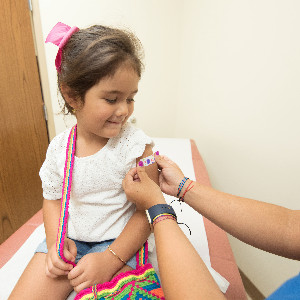By the Minnesota Council of Health Plans and the Minnesota Hospital Association
With the arrival of fall, it’s time we went “back to school” on measles, and why the MMR (measles, mumps and rubella) vaccination is vital. So, here’s a little “Measles 101,” including information on why it’s important — and safe — to be vaccinated against it.
Measles can be serious, even fatal, in small children. Measles symptoms can lead to pneumonia, brain damage, deafness and even death. Worldwide, measles kills more than 100,000 people a year, most under the age of 5.
Measles is highly contagious. Overall, 90% of people who come in contact with measles will catch it if they’re not vaccinated. It’s spread through the air when infected people breathe and cough, and it can stay there for long periods of time. People have contracted measles from walking into a room where infected people stood two hours earlier.
Measles is preventable. Like COVID-19, measles is caused by a virus. But unlike COVID-19, we’ve long had a safe and effective vaccine to prevent it. This vaccine has been so effective that the U.S. declared measles “eliminated” in 2000.
Measles outbreaks in the U.S. are on the rise. After a long period of decline, 2019 saw the most U.S. measles cases in the last 25 years. This is largely due to myths and misinformation about vaccines in general. To be clear: Vaccines do not cause autism spectrum disorder, infant immune systems are strong enough to handle current vaccination schedules (and infants are at risk for exposure and infection if you space immunizations out), and there’s no risk of getting the measles from the vaccine.
Additionally, the following are some commonly asked questions about measles:
How do I know if my child might have measles?
Measles symptoms usually appear 10-14 days after exposure to the virus. They can include fever, dry cough, runny nose, sore throat, inflamed eyes (conjunctivitis), diarrhea, ear infections, a blotchy skin rash, and the appearance on the inner lining of the cheek of tiny white spots with bluish-white centers on a red background.
When should I get my child vaccinated against measles?
The measles vaccine is combined with mumps and rubella in what’s called the MMR vaccine. Your child should get this shot when they’re 12-15 months old, and again when they’re between 4 and 6. If you have a child between 6 and 12 months that will be traveling internationally or to a place that’s experiencing a measles outbreak, they should get an early MMR vaccine.
What if I’ve have never received a measles vaccine?
If you were born in or after 1957 and have never had measles or been inoculated against it, then you should get at least one dose of the MMR vaccine as soon as possible.
What should I do when I’m done reading this article?
If you have any concerns that you or your children are not up to date on measles shots, please talk to your doctor about next steps. For more information on why the measles vaccine is so important this year, click here.